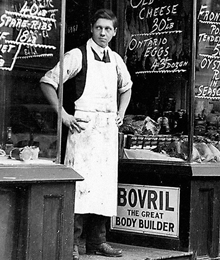Butcher Shop – A Job Well Done
June 14, 2012 by Michael Hill
Filed under Food
 John Zagaria nods towards a black and white photo hanging by the register in his Vaughan butcher shop, Dolce Lucano. “That’s my father, Rocco,” he says, pointing to a youthful face standing behind a slain cow. He’s surrounded by a handful of beaming family members posing in a dilapidated, old-world setting – conditions that simply wouldn’t cut it by today’s strict sanitation standards. “That’s as crude as it gets,” Zagaria adds as he gazes fondly at the roots of his craft.
John Zagaria nods towards a black and white photo hanging by the register in his Vaughan butcher shop, Dolce Lucano. “That’s my father, Rocco,” he says, pointing to a youthful face standing behind a slain cow. He’s surrounded by a handful of beaming family members posing in a dilapidated, old-world setting – conditions that simply wouldn’t cut it by today’s strict sanitation standards. “That’s as crude as it gets,” Zagaria adds as he gazes fondly at the roots of his craft.
Much has certainly changed since Zagaria’s father first learned how to wield the weighty cleaver that was once a standard tool of the butcher’s trade. That cumbersome blade – one only the brawny, dexterous hands of a master could brandish – is proudly displayed as Zagaria’s business logo. It’s both a nostalgic mark of the art’s evolution, and the time-honoured traditions that made butchers such integral parts of the community.
We could all use these reminders, especially as summer comes into stride. Soon backyards and barbeques will sizzle with life once again; for many, they may already have. And as we savour these moments with mouth-watering meats – racks of ribs, succulent chickens, and of course, thick tenderloins – it’s time to remember the faces behind the counter that ensure these cornerstones of backyard gatherings make it to our grill. While butchering’s old-fashioned methods have progressed with the times, open displays piled with assorted steaks, ribs, breasts and shanks have thankfully gone the way of the dodo – replaced, of course, with today’s hygiene-focused procedures. Zagaria explains that some things just never change. Personal customer service, for one, is irreplaceable. “It’s like when you find a good barber,” he says. “You tend to stick with them.” Through years of repeat visits, Zagaria grasps the tastes and preferences of his customers. Unless they want something specific, he knows their order the second they step through the door – a trait honed from years behind the counter.
His meat-cutting tutelage began at the ripe age of nine. It started with trimming bones in his father’s shop at Dufferin Street and Eglinton Avenue, where he worked for 24 years before moving to his Vaughan location 12 years ago. “My mother always says that as soon as she could let me go, I was always with my dad,” Zagaria says, describing father-son trips to local farms or the old stockyards down at Weston Road and St. Clair Avenue. “I spent so many days in that place,” he reminisces.
Like many modern entrepreneurs that embrace the family trade, Zagaria explains that becoming a butcher isn’t something you just walk into – it’s in your blood. “You don’t get up in the morning and say, ‘I want to be a butcher.’” It’s a calling, and it takes a certain dedication to stick with the messy job of preparing our meat.
When it comes to summer barbequing, Zagaria feels nothing beats a good steak. “Steak is almost foolproof,” he says, but with so many different cuts of beef available, how can you make a searing impression on guests? “Tomahawks are really popular,” he says while grabbing the wrapped, axe-like piece of meat. The bone-in, rib-eye steak is dramatic to the eye as it is on the taste buds.
Zagaria’s shop, which also provides various types of meat to roughly 90 top restaurants throughout Toronto
and the GTA (I’ve assured him no name-dropping would touch the page; he prefers the anonymity), is recognized for its unique, specialty cured meat as well. From a mildly seasoned wild boar called cacciatorini to a more spicy Calabrese, Zagaria makes over 20 varieties of salami in-house. “It’s not like I have a research and development division. It’s pretty much trial and error,” he says as he describes the process. He works backwards with new recipes, conceptualizing a particular taste and reverse-engineering it from there. “To dry cure a product, it’s not made today and sold tomorrow. It entails sometimes six, eight, or anywhere up to 24 months, depending on how we’re curing it.” It’s a specialty no mammoth, big-box grocery store replicates, and one that keeps Dolce Lucano busy with both discerning clientele and the city’s leading chefs. “It’s great when you go to a restaurant and you see your name on the menu,” he says. “It’s the biggest compliment.”
Across town, on the city’s northeast side, Sam Totera, co-owner of Totera Fine Foods, is carving a niche as well. Even with goliath supercentres breathing down his neck, Totera and his brother and partner, Mike, feel that the personal service independents offer trumps the size and scope of big-box. “We stress giving good service, giving people something different than what they can’t find anywhere else,” Totera says. It’s a timeless attitude, adopted from their parents who started in the meat business over 30 years ago.
The brothers grew up in their parents’ shop, helping where they could, learning the ins and outs of retail, the do’s and don’t’s of the trade. “We had a passion for it so we kept it going,” says Totera. “We carried it forward.” But much like the butchers of the not-so-distant past, the Totera brothers have adapted to the shifting climate. In the good old days, buying a large hunk of meat and having it cut into smaller pieces to take home was the norm for regular clientele. You wouldn’t see them for a couple of months, Totera explains. Today’s shoppers, however, crave freshness. Patrons regularly visit, generally on a weekly basis, to ensure the food they serve family and friends is as fresh as possible.
The hustle and bustle of today’s world has also fostered a market for oven-ready products. From elegantly prepared mushroom caps and stuffed peppers, to a variety of kabobs, customers will find many in-house prepared items. They’re traditional creations, pulled from Totera’s mother’s recipe book, but taken to the next level. “Back in the day, it wasn’t as popular, but now I think because society’s getting to be very busy with both parents working, there’s a need for it,” Totera says.
They’ve also heeded concerns for quality. More customers desire local produce, and the Totera brothers have listened. Carrying a variety of Mennonite-grown meat, including lamb and veal, as well as antibiotic-free pork, organic chicken and nitrate-free sausage, the pair meets the needs of conscious consumers. “A lot of children in the area can’t have any gluten,” Totera adds. “They need a lot of gluten-free products, so we cater
to that.”
The lively shop, which opened in 2007, also features a unique setup where butchers work behind glass – a transparent concept that keeps customers involved in the process. This openness continues to foster the atmosphere of olden times, when your butcher was a prominent community figure. “We take pride in that. We have customers who come in and they’ll say, ‘I want to be served by so-and-so,’ and they’ll wait for five, 10 minutes until he’s not busy, and they’ll get him to cut their meat,” says Totera. “There are a lot of relationships here.”
For summer get-togethers, Totera leans towards a premium cut of Angus steak, but many customers enjoy their lamb spiducci and porchetta. “The whole pork roast,” he explains, “can be served at room temperature. They just slice it, pair it with bread and you’re good to go.”
Ambrogio Loconte is also walking in his family’s footsteps, keeping their business, Loconte Meat Market, alive and well. “We’ve been in business for over 40 years,” he says with pride. His grandparents began the brand with a focus on fruits and vegetables before his father introduced meat into the equation, which remains at the core of their business today. From beef, such as Asado ribs and AAA steaks, to veal and pork to chicken and spiedini, it’s all local fare. “It’s all Mennonite-grown meat, stuff my father buys live once a week at an auction,” says Loconte. Unlike the boxed-and-shipped cuts found at
big-box groceries, their meat comes from farms just down the road, and that focus on local goods is essential. “We make our customers understand that the stuff we have here is the stuff we take home,” he adds.
Like the others, Loconte worked at his parents’ store from a young age. “I was born and raised in it,” he says, describing days of washing dishes, cleaning counters, stocking shelves or taking meat off the bone.
It’s a business of six – at most seven – family members, and this tight-knit clan has learned to pick up the slack where necessary. “I do everything, wherever I’m needed,” he says of his role at the shop. “That’s basically how it works with family business.” This traditional, down-to-earth attitude has cultivated a dedicated following of regular clientele, all of whom appreciate the personal attention and welcoming atmosphere. “We know a lot of our clients on a first-name basis; they are people who’ve been coming here for years,” says Loconte, who prefers a nice barbequed rib-eye steak for summer dining.
“When you go into the small independent stores, you get not only the product but you see them putting their heart and soul into it,” says Marylou Stalteri, who, along with her husband, Renato, own Siderno Quality Meat. “They’re proud, and there’s that personal touch.”
You want to make sure it’s 150 per cent before you give it to someone,” she adds.
Renato emigrated from Italy in 1983, opening his first Toronto store on College Street in 1988 when he was 23. After relocating to another College site, Renato opened a second location in Maple. The husband-and-wife duo eventually closed the College location to focus on their Maple store. “We liked it because it was a small community, it wasn’t a big city, and most of the customers became friends,” says Marylou, a statement affirmed as she socializes with a regular popping by for some fresh eats.
They’ve watched children grow, delivered groceries to those who needed assistance, and provided for church and community events. It certainly isn’t rare, either, to see staff members – some who have worked at Siderno since it first opened 15 years ago – socializing with customers over an espresso. “You have to enjoy working with people,” she says, explaining how they encourage staff to develop one-on-one relationships
with customers.
And that sums it all up right there. While meat is, well, the meat of their business, the backbone is always the customer. People who smile every time you walk through the door; people who know your likes and dislikes, and prepare your request exactly to the letter; and people who ask, “How’s the family?” long before they ask for your order. Gone may be the old-world ways of preparing meat, but the people remain the same. And that’s something that will always be a prime priority.
Dolce Lucano: 133 Regina Rd., Woodbridge 905.265.8445
Totera Fine Foods: 2414 Major Mackenzie Dr., Maple 905.879.8325
Loconte Meat Market: 200 Marycroft Ave., Woodbridge 905.856.0024
Siderno Quality Meats: 2354 Major Mackenzie Dr., Maple 905.303.1600















Comments
Feel free to leave a comment...
and oh, if you want a pic to show with your comment, go get a gravatar!